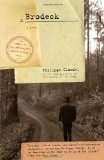Summary | Excerpt | Reading Guide | Reviews | Beyond the Book | Readalikes | Genres & Themes | Author Bio

A Novel
by Phillipe Claudel
I almost never go to Schloss's inn because, I must confess, Dieter Schloss makes me uneasy, with his darting mole's eyes, his bald pink cranium, his eternally sweaty forehead, his brown teeth that smell like dirty bandages. And then there's another reason, namely that ever since I came back from the war, I don't seek out human company. I've grown accustomed to my solitude.
The evening when the Ereignies took place, old Fedorine had sent me to the inn to get a bit of butter because we'd run out and she wanted to make some little shortbreads. Ordinarily, she's the one who fetches provisions, but on that baleful evening my Poupchette was lying in bed with a bad fever, and Fedorine was at her side, telling her the story of "Bilissi and the Poor Tailor," while Amelia, my wife, hovered nearby, ever so softly humming the melody of her song.
I've thought a great deal about that butter since then, about the few ounces of butter we didn't have in the pantry. You can never be too aware of how much the course of your life may depend on insignificant things--a little butter, a path you leave to take another path, a shadow you follow or flee, a blackbird you choose to kill with a bit of lead or decide to spare.
Poupchette's beautiful eyes shone too brightly as she listened to the old woman's voice, the same voice I'd listened to in days gone by, coming from the same mouth--a younger version of the same mouth, but already missing a few teeth. Poupchette looked at me with her eyes like little black marbles, burning with fever. Her cheeks were the color of cranberries. She smiled, stretched out her hands to me, and clapped them together, quacking like a duckling. "Daddy, come back Daddy, come back!"
I left the house with the music of my child's voice in my ears, mingled with Fedorine's murmuring: "Bilissi saw three knights, their armor bleached by time, standing before the doorstep of his thatched cottage. Each of them carried a red spear and a silver shield. Neither their faces nor even their eyes could be seen. Things are often thus, when it's far too late."
II
Night had dropped its cape over the village as a carter flings his cloak over the remains of his campfire. The houses, their roofs covered with long pinewood tiles, exhaled puffs of slow blue smoke and made me think of the rough backs of fossilized animals. The cold was beginning to settle in, a meager cold as yet, but we'd lost the habit of it because the last days of September had been as hot as so many baking ovens. I remember looking at the sky and seeing all those stars, crowded against one another like scared fledglings looking for company, and thinking that soon we would plunge, all of a sudden, into winter. Where we live, winter seems as long as many centuries skewered on a giant sword, and while the cold weather lasts, the immensity of the valley around us, smothered in forests, evokes an odd kind of prison gate.
When I entered the inn, almost all the men of the village were there. Their eyes were so somber and their immobility so stony that I immediately guessed what had happened. Orschwir closed the door behind me and stepped to my side, trembling a little. He fixed his big blue eyes on mine, as if he were seeing me for the first time.
My stomach started churning. I thought it was going to eat my heart. Then I asked, in a very weak voice--staring at the ceiling, wanting to pierce it with my gaze, trying to imagine the Anderer's room, trying to imagine him, the Anderer, with his sideburns, his thin mustache, his sparse curly hair rising in tufts from his temples, and his big round head, the head of an overgrown, good-natured boy--I said, "Tell me you haven't... you didn't...?" It was barely a question. It was more like a groan that escaped from me without asking permission.
Excerpted from Brodeck by Philippe Claudel Copyright © 2009 by Philippe Claudel. Excerpted by permission of Nan A. Talese, a division of Random House, Inc. All rights reserved. No part of this excerpt may be reproduced or reprinted without permission in writing from the publisher.
On the whole, human beings want to be good, but not too good and not quite all the time
Click Here to find out who said this, as well as discovering other famous literary quotes!
Your guide toexceptional books
BookBrowse seeks out and recommends the best in contemporary fiction and nonfiction—books that not only engage and entertain but also deepen our understanding of ourselves and the world around us.